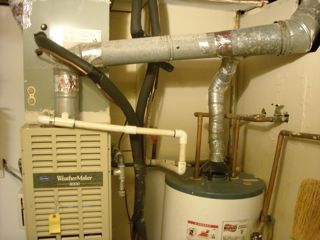Furnaces and water heaters are not the same. A furnace heats air for the home, while a water heater heats water for domestic use.
Understanding the differences between a furnace and a water heater is essential for homeowners. Both play crucial roles in maintaining comfort and convenience. A furnace works by circulating warm air throughout the home, ensuring a cozy environment during colder months.
On the other hand, a water heater provides hot water for showers, washing dishes, and other daily tasks. Knowing how each system operates helps you make informed decisions about maintenance and replacement. It’s vital to choose the right system for your needs to ensure energy efficiency and comfort in your living space.
Page Contents
- 1 Introduction To Home Heating Systems
- 2 Key Differences Between Furnaces And Water Heaters
- 3 The Role Of A Furnace In Home Heating
- 4 Understanding Water Heaters
- 5 Energy Efficiency Comparison
- 6 Installation And Maintenance Insights
- 7 Cost Analysis: Furnace Vs. Water Heater
- 8 Choosing The Right System For Your Home
- 9 Frequently Asked Questions
- 10 Conclusion
Introduction To Home Heating Systems
Furnaces and water heaters serve different purposes in a home. A furnace heats the air in your living space. It uses ducts to distribute warm air throughout the house. This system keeps homes comfortable during cold weather.
A water heater heats water for various uses. It provides hot water for showers, dishes, and laundry. There are two main types: tank and tankless models. Tank water heaters store hot water, while tankless ones heat it on demand.
Understanding these differences is essential for homeowners. Choosing the right system ensures comfort and efficiency. Regular maintenance keeps both systems running well.

Credit: www.reddit.com
Key Differences Between Furnaces And Water Heaters
The furnace and water heater serve different purposes. A furnace heats the air in a home. It circulates warm air through ducts. A water heater warms water for daily use. This includes showers, washing dishes, and laundry.
Both systems operate differently. A furnace uses gas, oil, or electricity for heat. It relies on a thermostat to control temperature. In contrast, a water heater heats water directly. It can use gas or electricity as well.
| Feature | Furnace | Water Heater |
|---|---|---|
| Purpose | Heats air | Heats water |
| Operation | Circulates warm air | Heats water directly |
| Energy Source | Gas, oil, or electricity | Gas or electricity |
The Role Of A Furnace In Home Heating
The furnace plays a vital role in home heating. It warms the air and sends it through ducts. Different types of furnaces include gas, electric, and oil. Each type has its own heating method.
Gas furnaces are popular due to their efficiency. They burn natural gas to produce heat. Electric furnaces use electricity to create warmth. They are easier to install but may cost more to operate.
Oil furnaces rely on heating oil. They are often found in areas without gas lines. Each furnace type has benefits based on energy sources and availability.
| Furnace Type | Heating Method | Efficiency |
|---|---|---|
| Gas | Burns natural gas | High |
| Electric | Uses electricity | Medium |
| Oil | Burns heating oil | Variable |
Understanding Water Heaters
Water heaters warm up water for daily use. They work by heating cold water and delivering it to taps and appliances. Different methods can heat water. Some use electricity, while others use gas. Solar heaters use the sun to warm water. Each type has its benefits.
Common types of water heaters include:
| Type | Description |
|---|---|
| Tank Water Heater | Stores hot water in a tank for use. |
| Tankless Water Heater | Heats water on demand, no storage needed. |
| Heat Pump Water Heater | Uses electricity to move heat from air or ground. |
| Solar Water Heater | Uses solar energy to heat water. |
Energy Efficiency Comparison
Furnaces and water heaters serve different purposes. They heat air and water, respectively. Efficiency is key for both systems.
Furnace efficiency is measured using the Annual Fuel Utilization Efficiency (AFUE) rating. A higher AFUE means better energy use. Most modern furnaces have an AFUE of 80% or more.
Water heater efficiency often uses the Energy Factor (EF). This factor shows how well the heater converts energy into hot water. Higher EF ratings indicate better efficiency. Tankless water heaters usually offer the best efficiency.

Credit: www.reddit.com
Installation And Maintenance Insights
Understanding the installation requirements for furnaces and water heaters is crucial. Both systems need proper ventilation. They also require a power source. Always check local building codes before starting installation. It’s important to follow these codes to ensure safety.
Regular maintenance keeps both systems running efficiently. Check the filters on your furnace every month. Clean or replace them as needed. For water heaters, inspect the anode rod once a year. This part prevents rust. Flushing the tank every six months helps remove sediment.
| Maintenance Task | Frequency |
|---|---|
| Check Furnace Filters | Monthly |
| Inspect Anode Rod | Yearly |
| Flush Water Heater Tank | Every 6 Months |
Cost Analysis: Furnace Vs. Water Heater
The initial investment for a furnace and a water heater can vary widely. A furnace typically costs between $2,000 and $6,000. Water heaters range from $500 to $1,500. The price depends on the type and brand chosen.
Long-term costs also differ. Furnaces require regular maintenance. This can add up to $150 annually. Water heaters have lower maintenance needs. Their costs average around $100 each year. Over time, these expenses can impact your budget.
| Item | Initial Cost | Annual Maintenance Cost |
|---|---|---|
| Furnace | $2,000 – $6,000 | $150 |
| Water Heater | $500 – $1,500 | $100 |

Credit: www.greenbuildingadvisor.com
Choosing The Right System For Your Home
Choosing the right system for your home is very important. Furnaces heat your home, while water heaters provide hot water. Understanding the differences helps in making the best choice.
Start by assessing your needs. Consider your home’s size and the number of occupants. Think about how much hot water you use daily. These factors determine the right system.
Seeking professional consultation can provide valuable insights. Experts help evaluate your home’s requirements. They can suggest the most efficient systems available. Getting a professional opinion ensures you choose wisely.
Frequently Asked Questions
Is My Furnace Connected To My Water Heater?
Furnaces and water heaters typically operate independently. They serve different purposes: heating air and water, respectively. Some systems may share venting or flue pipes, but they are not directly connected. Always consult a professional for specific configurations in your home.
Does A Furnace Control Hot Water?
A furnace typically heats air, not water. However, some systems, like boiler furnaces, do heat water for radiators or taps. Always check your specific system type to understand its functions.
Is A Furnace And Heater The Same Thing?
A furnace and a heater are not the same. A furnace specifically refers to a system that heats air, while a heater can refer to various devices that warm spaces or liquids. Understanding this distinction is essential for choosing the right heating solution for your needs.
Can A Water Heater And Furnace Be In The Same Room?
Yes, a water heater and furnace can be in the same room. Ensure proper ventilation and clearance for safety. Check local building codes for specific requirements. Regular maintenance is essential to prevent hazards and ensure efficient operation. Always consult a professional if unsure about your setup.
Conclusion
Understanding the differences between a furnace and a water heater is crucial for homeowners. Each serves a unique purpose in maintaining comfort and convenience. Proper knowledge helps in making informed decisions about repairs or replacements. Recognizing their roles ensures a cozy home environment, so always consult a professional for specific needs.
